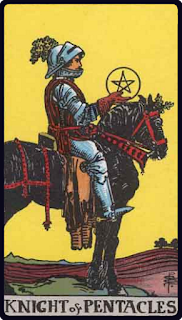
Representing discipline; the Knight of Pentacles represents the recognition of progress and achievement, as well as an understanding of the need to pass on our legacy to others. The Knight of Pentacles represents an authority figure who wishes to teach others who desire to achieve what they have done.
In the upright state the Knight of Pentacles represents a prompt to share our wealth with those who seek to further their own, to impart knowledge and wisdom and to relate our experience to help guide them on their journey; a prompt to assume the role of mentor and provide guidance when it is asked of us by others.
In the inverted state the Knight of Pentacles represents what is still unknown to us, the mystery and intrigue of the material realm, and a recognition of the limit of our understanding. The inverted Knight asks us to accept our ignorance so that we may open our minds to the opportunity to learn from others in turn.
In the Rider-Waite deck the Knight of Pentacles depicts a Knight upon a black horse bridled with red reins, symbolising flow of blood, the impermanence of life and sacrifice set against death and the permanence of the material realm. The Knight holds in the palm of his hand a single pentacle, here the palm is outstretched, either as a gift or in fascination and admiration representing the need to be charitable and the need to understand our own limitations.
Once more the Knight stands before the vineyard now barren and void of vines representing the origin of wealth and the desire to help those who are about to set out on the same journey of cultivation.
In self-reflection the Knight of Pentacles serves as a prompt to consider the legacy we will leave behind for others, this is framed as the creation of a roadmap for those who will eventually take our place or find themselves in a similar situation.
The simplest question to ask is “What did I not figure out?” and “Who would understand this?” and consider who or what you would consult for guidance. It can be most helpful here to imagine the other person dealt the Ace of Pentacles and to consider what advice you would give them for their journey.
Where the Page of Pentacles dealt with passing on what you have learned, the Knight of Pentacles instead focuses on the approach, you do not want to decide their direction, but rather you want to nurture within them the ability to discover the answers for themselves. In addition, where the Page of Pentacles dealt with actions and outcomes, the Knight of Pentacles instead deals with protocols and procedures – or to put it another way, the Page of Pentacles answers the question of what, but the Knight of Pentacles answers the question of how.

No comments:
Post a Comment
All comments are moderated before they are published. If you want your comment to remain private please state that clearly.